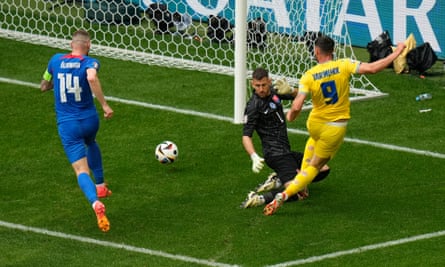At the final whistle, the Ukraine players gathered in the penalty area in front of the mass of their fans and performed a thunderclap, the connection between those on the pitch and those in the stand obvious.
The second-half comeback would have been remarkable enough anyway but for them no game is just a game. Every appearance is an opportunity to remind the world of their continued existence and suffering; every win has a resonance far beyond football.
After the 3-0 defeat by Romania, Ukraine needed that. “Today there was a different spirit,” said their coach, Serhiy Rebrov. “They showed the spirit of Ukraine on the pitch and deserved this win. It was an important win for our players, our country and our supporters.” Yet for a long time, his side seemed anxious, as though overawed by their obligation. “We needed our mental strength today,” said the midfielder Mykola Shaparenko.
The game was always likely to be overshadowed by the political context. Even beyond Kylian Mbappé and Marcus Thuram and their explicit appeals against the Rassemblement National in France, politics has lingered just below the surface of this tournament.
There were the disgraceful chants directed at Serbs by Albania and Croatia fans in Hamburg; the Kosovan journalist banned for making an eagle gesture at Serbia fans who were abusing him; English and Serbian fans booing each others’ anthems at least in part as a consequence of the Nato bombing of Belgrade; Hungarian fans with their irredentist power ballads and songs now associated with the German far right; Austrian fans booing La Marseillaise in recognition that it was originally the war song of the army of the Rhine in the war of the first coalition in 1792 … good luck to the Spain goalkeeper Unai Simón and his suggestion everybody stick to football.
But when the draw was made no game seemed as politically charged as this. When the nationalist Robert Fico became prime minister of Slovakia last year, he vowed to reduce aid to its eastern neighbour while pursuing a policy of greater alignment with Hungary, whose prime minister, Viktor Orban, has been the most overtly pro-Vladimir Putin voice among EU leaders. Fico’s ally Peter Pellegrini was elected as president in April. Last month, Fico was shot twice at close range while meeting the public in Handlova, about 120 miles north-east of the capital, Bratislava. Police arrested Juraj Cintula, a 71-year-old poet who has spoken openly of his opposition to Fico’s attempts to curtail the freedom of the press, to downgrade anticorruption bodies and to reduce support for Ukraine.
Fico is recovering and has unsurprisingly sought to make political capital out of the incident, condemning the violence of the left and the EU’s inability to accommodate divergent opinions, while the deputy prime minister and defence minister Robert Kalinak serves as interim prime minister.

Relations in the stadium seemed relatively cordial, the game engaging enough to prevent the mind from wandering too much to foreign policy considerations. This is not the Slovakia to which the world has become accustomed, the dull grinders of the past two Euros whose games often felt like cruel tests of endurance. This iteration, under the former coffee salesman Francesco Calzona, is crisp, lively and complex with distinct fruity notes. Inevitably, they press with gusto.
Slovakia took the lead after 17 minutes with a goal that already felt overdue, Lukas Haraslin left untended from a throw-in to cross for Ivan Schranz, who had got the only goal against Belgium, to pull away from Oleksandr Zinchenko and nod in. “I’m happy with my team’s performance,” said Calzona. “But we afforded the opposition half an hour where they punished us.” His side, nonetheless, are guaranteed to qualify for the last 16 if they beat Romania on Wednesday. They may have to do so without the highly regarded Feyenoord left-back David Hancko who was forced off with a hamstring injury.
“I didn’t shout at half-time,” said Rebrov. “Unfortunately in the first half we didn’t press well. I said to the players the second half was our chance.” They seized it. Oleksandr Tymchyk did hit a post in the first half, but Ukraine were much improved in the second half. They levelled as Mykola Shaparenko swept in a Zinchenko cross, and Mykhailo Mudryk hit a post before the clankingly large substitute Roman Yaremchuk scored the 80th-minute winner, taking down Shaparenko’s ball with an incongruously deft touch before nudging it past Martin Dubravka. It only just got over the line, but for Ukraine it was more than enough.








More Stories
Amorim insists Fernandes not leaving Manchester United amid Madrid reports
How debt burden pushed Nigerian boxer Segun Olanrewaju to a fight that took his life
Nigeria Taekwondo Federation boss, Abdullahi Saidu dies at 53